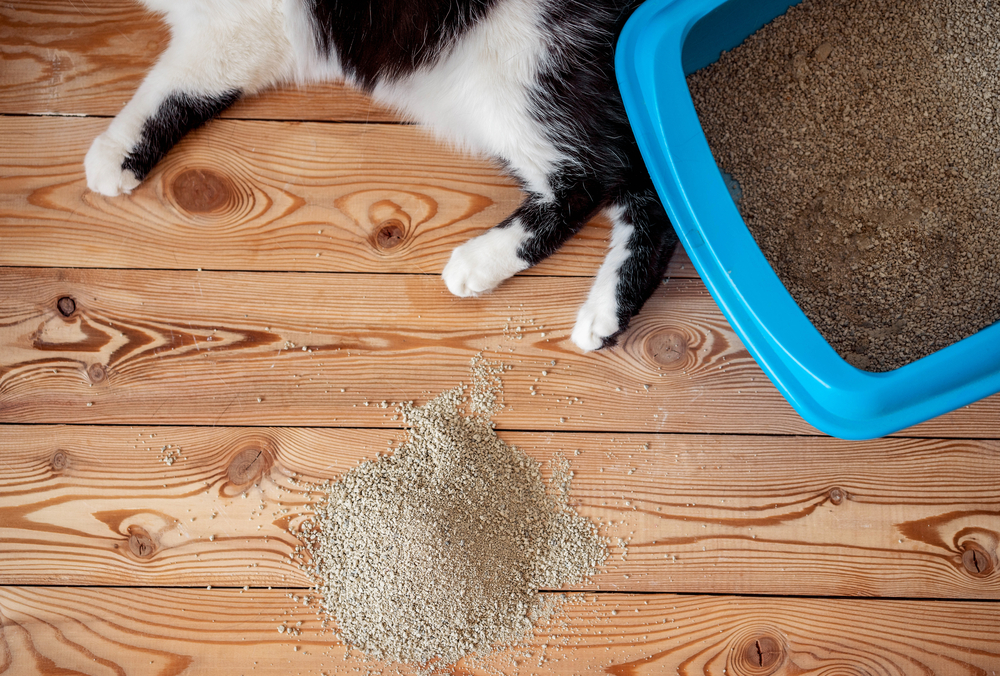Letters From the Litter Box—Why Your Cat is Peeing Outside the Box

Coping with a cat who urinates outside their litter box can be extremely frustrating. You may suspect these mysterious creatures have some kind of vendetta against humanity (or at least against you)—after all we’ve done for them! Before you start sleeping with one eye open, let Bayside Animal Hospital unbox the messages your cat is trying to send, so you can tell your cat, “message received,” and take the appropriate steps to fix the problem.
#1: Your cat has a medical condition
Urinary tract disorders will cause the most fastidious cat to miss their litter box. Increased urgency can prevent cats from reaching their box. Painful urination may become associated with their box, which may cause avoidance. Cats will indicate their pain by vocalizing when urinating. Urinary tract conditions include:
- Urinary tract infections
- Cystitis (i.e., bladder inflammation)
- Bladder or urethral stones
- Kidney stones
- Urinary blockage
If your cat has been vocalizing, straining to urinate, and restless, they may have a urinary blockage. This is an emergency, and your cat needs immediate veterinary attention to prevent bladder rupture.
#2: Your cat is scared or stressed
If our Bayside Animal Hospital veterinarians have ruled out any medical reasons for your cat’s inappropriate urination, look next at your cat’s environment. Cats are highly sensitive to their home, and can react fearfully or anxiously to changes, including changes that do not seem to directly affect them. Cats may perceive these changes as threats, and respond with spraying or urine marking. Upsetting changes may include:
- Rearranged furniture
- An absent family member
- A new house guest or family member—including pets
- An object with foreign scents
- Disrupted schedule
- Too much or too little social interaction
- An outdoor cat or stray passing too close to your cat’s territory
Spraying or urine marking in cats is a natural but undesirable behavior. They commonly spray on vertical and horizontal surfaces, and will often continue to use the litter box as well. Ask your veterinarian to determine the cause of your cat’s stress, and for methods to break the spraying habit.
#3: Your cat does not like something about their box
One size does not fit all when it comes to litter box design and maintenance. An abrupt change to your cat’s box, or inappropriate box selection or location for a new cat, can send your cat seeking alternative places to eliminate. A few critical points to consider about your cat’s litter box include:
- Cleanliness — Clean your cat’s litter box at least once a day. Once a week, completely change the litter, first scrubbing the box with a gentle soap and rinsing with diluted bleach and water.
- Size and shape — The box should be large enough for your cat to turn around and dig—one and a half times their body length is sufficient. Cats tend to prefer open boxes, but shy cats may appreciate a covered box.
- Substrate — Cats appreciate soft, fine, clumping litter that mimics natural sand and soil. Avoid litters with added fragrances. Never give kittens clumping litter in case of ingestion. The litter should be no more than two inches deep.
- Location — Select a quiet, low-traffic spot in your house for your cat’s litter, in a different location from their food and water.
#4: Your cat is being bullied
Other cats and dogs may prevent or discourage your cat from taking a trip to the litter box. Cats’ territorial nature may lead to a bully cat guarding a specific box, or blocking other cats. Dogs may charge a cat while they are using the box, or chase the cat away. Eliminate peer pressure by providing one litter box per cat, plus one additional box, and keeping the boxes behind a gate or barrier if you have dogs.
#5: Your aging cat needs some assistance
Sixty percent of cats suffer from osteoarthritis, with that number soaring to 90 percent in cats more than 10 years old. Your senior cat’s aching joints may need some help to make litter box usage more comfortable, and thus, they likely will be more reliable. Deteriorating senses and cognitive dysfunction can also complicate your senior’s ability to make it to the box.
- Handi-cat accessible — Low sided boxes are appreciated by seniors. Cut a low doorway in a shallow plastic storage box for an affordable, easy-access litter box. Ensure you wrap the cut edges with duct tape to prevent abrasions.
- Low-impact litter — Use soft, fine litter to make digging easier.
- Where’s the nearest bathroom? — Senior cats can benefit from additional, easily accessible boxes on all home levels. Ensure that your senior cat does not need to take the stairs to reach their litter box.
Now that you know some reasons why cats are sending odiferous messages when they urinate outside their litter box, you can respond with solutions, rather than frustration and confusion. If your cat is not using their litter box, first contact Bayside Animal Hospital, to schedule a wellness checkup and rule out any medical reasons.


